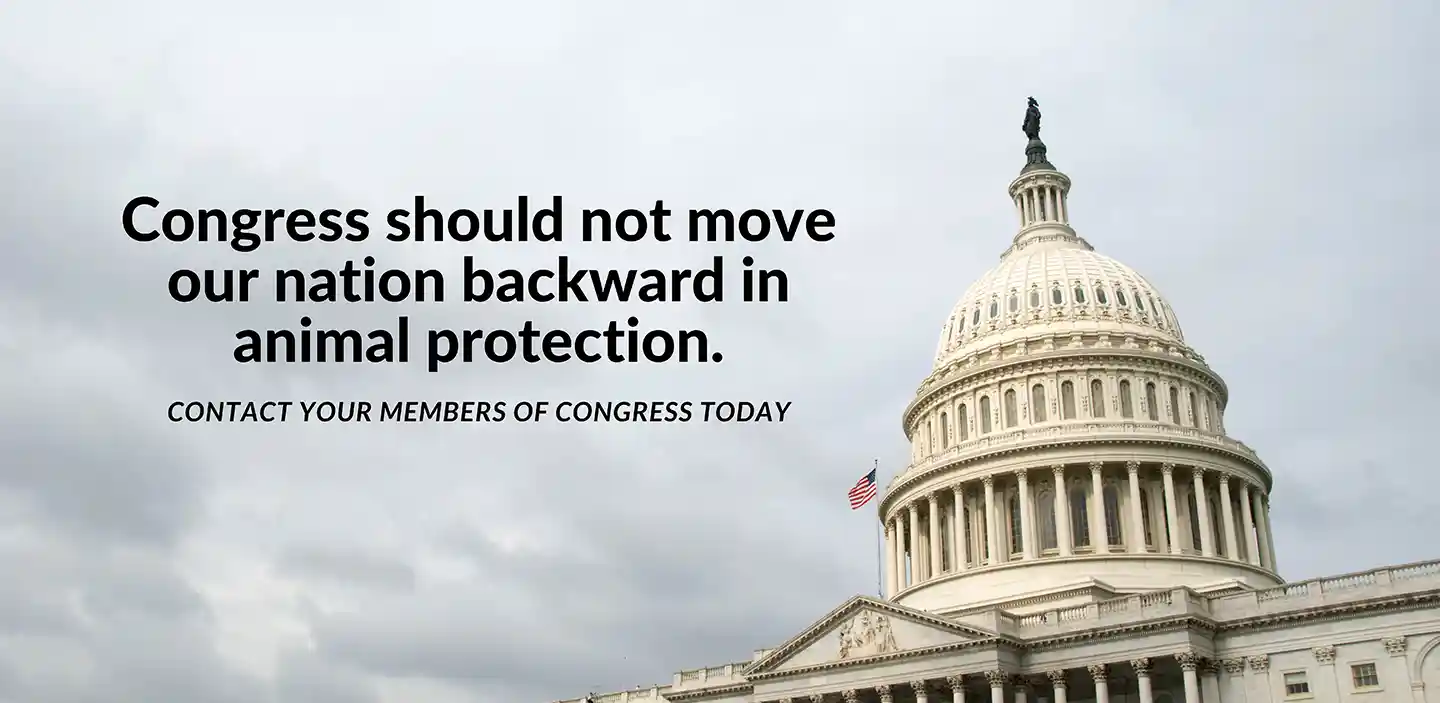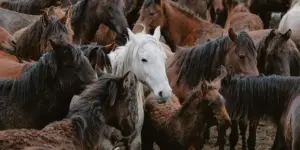 Lawmakers in Congress are currently working on the Fiscal Year 2026 federal budget, which begins on October 1, 2025. The funding of federal agencies and programs has a sweeping effect across the country—and it even impacts animals here in New Mexico. While the U.S. Senate is preparing to take up its version of the bill, the U.S. House of Representatives’ version of the budget has been passed out of committee and is headed to the House floor. Here’s what to watch.
Lawmakers in Congress are currently working on the Fiscal Year 2026 federal budget, which begins on October 1, 2025. The funding of federal agencies and programs has a sweeping effect across the country—and it even impacts animals here in New Mexico. While the U.S. Senate is preparing to take up its version of the bill, the U.S. House of Representatives’ version of the budget has been passed out of committee and is headed to the House floor. Here’s what to watch.
Support For New Mexico Co-Sheltering Domestic Violence Survivors and Their Animals Is Under Threat
 With help from Animal Protection New Mexico’s CARE program services, approximately 1 in 3 domestic violence shelters in New Mexico provide co-sheltering practices, surpassing the national average of 17%. Co-sheltering saves lives by allowing crisis shelters to provide temporary housing to humans and their companion animals together. This is an important type of shelter because survivors of domestic abuse cite their companion animals as family members and crucial to their healing—and they report delaying leaving an abusive situation if they can’t take their animals with them. While New Mexico leads the nation in this movement, many shelters in our state still do not have the resources to transition to a co-sheltering model.
With help from Animal Protection New Mexico’s CARE program services, approximately 1 in 3 domestic violence shelters in New Mexico provide co-sheltering practices, surpassing the national average of 17%. Co-sheltering saves lives by allowing crisis shelters to provide temporary housing to humans and their companion animals together. This is an important type of shelter because survivors of domestic abuse cite their companion animals as family members and crucial to their healing—and they report delaying leaving an abusive situation if they can’t take their animals with them. While New Mexico leads the nation in this movement, many shelters in our state still do not have the resources to transition to a co-sheltering model.
The federal Protecting Animals with Shelter (PAWS) grant program was enacted through the 2018 Farm Bill, and the program was previously allocated $3 million dollars annually so that shelters could renovate and make services available to support co-sheltering. But last month, the House Appropriations Agriculture Subcommittee passed a version of their budget bill that lacked any funding at all for the PAWS program.
Thankfully, after help from congressional allies, the full House Appropriations Committee approved its version of the bill with a revived $1.5 million dollars. But with grant applications always surpassing available funds, the need is great, and full funding needs to be restored to the previous level of $3 million or more.
“These funds amount to a drop in the bucket for our federal government, and yet they represent everything to domestic violence survivors and their companion animals – warmth, safety, and a secure future. Congress must act now to restore full federal funding to keep our families together.”
~Judy Wolf, APNM Chief Program & Policy Officer – Humane Communities
Wild Horses Are Facing A Renewed Push For Mass Slaughter
 New Mexico is inhabited by many wild horses governed by state law, but the Land of Enchantment is also home to several small federally managed wild horse herds who are protected by the federal Wild and Free-Roaming Horses and Burros Act of 1971 (WFRHBA), administered by the Bureau of Land Management (BLM). These herds reside in two BLM herd management areas (Carracas Mesa and Bordo Atravesado) and three territories on U.S. Forest Service land (Jicarilla, Caja del Rio, and Jarita Mesa).
New Mexico is inhabited by many wild horses governed by state law, but the Land of Enchantment is also home to several small federally managed wild horse herds who are protected by the federal Wild and Free-Roaming Horses and Burros Act of 1971 (WFRHBA), administered by the Bureau of Land Management (BLM). These herds reside in two BLM herd management areas (Carracas Mesa and Bordo Atravesado) and three territories on U.S. Forest Service land (Jicarilla, Caja del Rio, and Jarita Mesa).
At a national level, as wild horse herds began to be restored under federal law, anti-wild horse interest groups (primarily cattle ranching interests) have pushed for the removal of wild horses from federal land. But thankfully, language was added in 2005 to the federal budget that prohibits the use of federal funds to facilitate the limitation-less sale and slaughter of wild horses and burros. In effect, this 20-year-old federal funding prohibition has been a de facto ban on killing healthy, unadopted wild horses or selling them into the slaughter pipeline.
However, this year’s budget, as passed by the House Appropriations Committee, eliminates the funding prohibition language, opening the door for mass euthanasia and selling for slaughter of the thousands of removed wild equines currently in federal corrals.
To make matters worse, the proposed budget slashes BLM’s Wild Horse and Burro Program budget by 25%. Over two-thirds of the Program’s budget already goes toward care for removed wild equines in holding facilities, leaving very little funding for the Act’s actual mandate for the humane management of wild equines with fertility control and the healthy maintenance of the range. The proposed budget is consistent with an intent to ignore humane population management methods and simply destroy the equine population in holding.
The FY26 federal budget bill must include the long-standing funding ban that protects wild horses from unfettered slaughter and cruelty, and it must provide an adequate budget to maintain removed horses while also working earnestly to stabilize populations with humane fertility control.
“Wild horses are intelligent, sensitive beings with strong family bonds. They deserve to live out their lives free on the range. It is time for the BLM to take responsibility for the humane, science-based management of these horses with fertility control instead of doubling down on cruel, ineffective roundups that tear families apart and leave horses languishing in holding facilities—and, if this budget passes, subject to mass euthanasia or sale for slaughter.”
~Nina Eydelman, APNM Chief Program & Policy Officer – Equine & Wildlife
Congress should not move our nation backward in animal protection
Companion animals, equines, and people are relying on Congress to ensure that federal agencies and programs embody the animal protection values of their constituents—not to abandon humane programs and policies. And while the House version of the federal budget does include helpful language that continues to ban domestic horse slaughterhouses from operating and endorses non-animal alternatives to reduce animal testing and research, the final bill cannot leave domestic violence survivors and majestic wild horses behind.
Contact your members of (your U.S. Representative and your two U.S. Senators) and urge them to:
- Restore PAWS Act grant funding to $3 million or greater
- Restore the BLM’s wild horse program budget and require humane fertility control
- Reinstate the federal funding prohibition on the slaughter and sale-without-limitation of excess wild horses and burros
